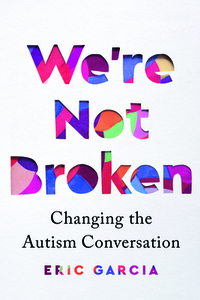You need to sign in or sign up before continuing.
Take a photo of a barcode or cover
emotional
inspiring
reflective
hopeful
informative
reflective
medium-paced
Excellent combination of story, information, and personal narrative. I truly connected with the author and feel this is the perfect introduction to autism for someone interested in learning a little about the experience, a little about the history, and a little about the science. This book intertwines those themes in a smooth and accessible way.
Minor: Suicide
informative
slow-paced
Narrated by the author, this book is an excellent and needed addition to the conversation about autism. Eric Garcia dispels stereotypes, presents the history of autism advocacy in the U.S., and provides factual and engaging information. I especially loved how Garcia talks about the bound treatment and liberation of neurodiverse, BIPOC, and LGBTQ+ people. As someone who is not autistic themselves but loves an autistic person (my gf), I highly recommend this book.
emotional
informative
inspiring
reflective
sad
medium-paced
I love this book. I highlighted and tabbed the hell out of it. So much was relatable, and so much more helped me understand those who are different from me by gender, sexuality, and race. Eric writes with love and having briefly engaged with him in the online space, he seems so genuinely lovely. I can't thank him enough for this book. It's obvious by the notes in the back, being as long as a book all on their own, that he put so much effort and time and love into this book. I'm feeling so seen.
I know some people have complained about the use of the R word in this book and I fully understand that criticism. I think Eric really did not hold back in this book and I know it is a controversial word amongst people in the community; if we can say it, if we can't, if it should be completely deleted from everyone's vocabulary... I was put off by reading it especially more than once. But I also understand why he included it in people's quotes because that's exactly their words.
Overall, this was an incredible read and more non-autistic people need to read it. It's validating for those who relate to it, but those who may not relate will at least get a better understanding of autism and life on the spectrum.
I know some people have complained about the use of the R word in this book and I fully understand that criticism. I think Eric really did not hold back in this book and I know it is a controversial word amongst people in the community; if we can say it, if we can't, if it should be completely deleted from everyone's vocabulary... I was put off by reading it especially more than once. But I also understand why he included it in people's quotes because that's exactly their words.
Overall, this was an incredible read and more non-autistic people need to read it. It's validating for those who relate to it, but those who may not relate will at least get a better understanding of autism and life on the spectrum.
DNF in the middle of chapter 3 of 9. After swearing fervently that this book would NOT be focused on the author but will rather tell the stories of numerous different autistic people from different walks of life, the author proceeds to focus the book entirely on himself in ways that frequently in no way involve his autism diagnosis but rather feel like an opportunity to simply talk himself up.
The times that Garcia does tell the stories of different people who he has interviewed, he introduces them with 0 prelude or context, throws in a quote or two, and then continues to tell his own story. While he repeatedly *states* that he knows his own experience is not indicative of all autistic people and that he has had the privilege of support, he does not reflect this claim in his actual writing as he repeatedly turns to his own experiences (with supportive parents including a stay at home mom, an early diagnosis, accommodations throughout both school and college, easy access to community activities such as college journalism, and a White House internship) as somehow indicative of the autistic experience.
I strongly believe that the level of support that Garcia received and continues to receive in life should be the norm. As a late diagnosed autistic person, I am so happy that Garcia was given the resources he deserved and needed to thrive. However, it feels inauthentic when Garcia writes things like how he's not entirely self-sufficient because he has a cleaning person and food delivery while simultaneously using his platform as a high-profile political journalist as an opportunity to write a book that purports to advocate for autistic people of all walks of life but feels like little more than a self-agrandizing testiment to his own success.
The times that Garcia does tell the stories of different people who he has interviewed, he introduces them with 0 prelude or context, throws in a quote or two, and then continues to tell his own story. While he repeatedly *states* that he knows his own experience is not indicative of all autistic people and that he has had the privilege of support, he does not reflect this claim in his actual writing as he repeatedly turns to his own experiences (with supportive parents including a stay at home mom, an early diagnosis, accommodations throughout both school and college, easy access to community activities such as college journalism, and a White House internship) as somehow indicative of the autistic experience.
I strongly believe that the level of support that Garcia received and continues to receive in life should be the norm. As a late diagnosed autistic person, I am so happy that Garcia was given the resources he deserved and needed to thrive. However, it feels inauthentic when Garcia writes things like how he's not entirely self-sufficient because he has a cleaning person and food delivery while simultaneously using his platform as a high-profile political journalist as an opportunity to write a book that purports to advocate for autistic people of all walks of life but feels like little more than a self-agrandizing testiment to his own success.
adventurous
hopeful
informative
fast-paced
informative
reflective
medium-paced
Moderate: Ableism
Minor: Bullying, Child abuse, Physical abuse, Self harm, Sexual assault, Forced institutionalization, Medical content, Medical trauma
challenging
informative
medium-paced
challenging
emotional
hopeful
informative
inspiring
reflective
medium-paced





